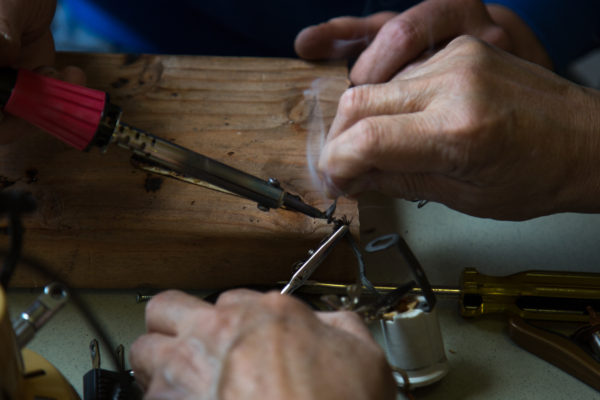What’s the recent word in repair? Here’s snapshots of what we’ve been reading over the past month.For this month’s cliffnotes, we excerpted highlights from each article in true cliffnotes fashion. Read synopses of each article, and click the title link for the full story!
Thank Google for making it harder to find a phone-repair service (Engadget):
“The majority of people using Google will click the first link shown to them, and that spot is available to rent, for a price. Unfortunately, this combination of trust and commerce means that top spot on Google is an easy target for fraudsters. The director of Global Product Policy said that Google had seen a ‘rise in misleading ad experiences, stemming from third-party technical support providers.’ As a consequence, Google began restricting ads in the relevant categories, namely for tech support. In the months that followed, however, hardware repair businesses found their ads blocked by Google.”
“Right to repair” advocates lobby over antitrust concerns (Axios):
“For years, activists for a so-called ‘right to repair’ have raised concerns about technology companies making it impossible for customers to go to anyone other than the manufacturer if they wanted to get their gear repaired, or restricting repairs to merchants that have the manufacturer’s blessing. Apple has become one flashpoint for the issue, given the prevalence of its smartphones. The House Judiciary Committee antitrust subcommittee’s inquiry into the market power of major tech platforms is one of many such proceedings in Washington. The Federal Trade Commission launched a tech task force and last week, the Department of Justice said it was carrying out its own wide-ranging investigation.”
Apple really doesn’t want you using a third-party battery in your iPhone (MobileSyrup):
“It seems Apple, unsurprisingly, doesn’t want iPhone owners to replace their smartphone’s battery on their own or through a third-party repair service. The tech giant recently rolled out a new software update that detects if a battery has been installed that lacks an official authentication key, according to iFixit. iFixit described this move on Apple’s part as “user-hostile” since it effectively discourages iPhone users from replacing the smartphone’s battery on their own. If you get your iPhone battery replaced at an official Apple Store or other authorized repair location, you have nothing to worry about and the message won’t appear. It’s worth noting that if you happen to get your hands on an official iPhone battery and decide to make the swap yourself, the notification will still pop up under Battery Health.”
Google’s efforts to fight scams may make phone repairs more expensive (Mashable):
“Google has been cracking down on ads from third-party repair services. The goal is to stop tech support scams from preying on unsuspecting users through Google ads. However, the ad ban is hurting many legitimate repair services. Google’s ad ban may have one clear beneficiary: big businesses. Although third-party repair services can no longer place ads with the search engine, major companies such as Best Buy, Verizon, and the makers of the electronics are allowed. The change is subtle, but it can have major ramifications for a consumer. The effect can compel a consumer to spend more, and even buy an entirely new phone, when they could’ve fixed their old one at a fraction of the cost.”
Smartphone sales are in freefall, and that’s totally okay (iFixIt.com):
“The longer you can hold onto your capable phone, the longer you can keep it out of the e-waste stream. Using your things for as long as you can is one of the most powerful assets you can contribute to a planet overrun with unnecessary waste. Companies don’t advertise the fact that, on most phones, you can replace a cracked screen or replace a worn battery. I recently sped up and streamlined a three-year-old Android phone, and you know what it did? It sent text messages, gave me directions, and let me look at depressing things on social media, just like a brand-new phone.”
And last but not least, some local stories:
What is recommerce? (The Renewal Workshop):
“The most simple version is that recommerce is another way of saying reselling. The economics of this secondary market are still emerging. Think about how value shifts from being old or used – and therefore worth less – to the magic moment when that age makes it antique or rare and the value skyrockets again. For us, we’ve chosen a particular role in the recommerce landscape. We’ve decided to restore clothing and textile products like bags and packs to increase their value and longevity. By restoring value, we reduce waste. By returning things to a better condition than we received them in, they can stay in use longer. By using the principles of circular business, we can change how business is done.”
Indigo Proof Q&A: Rain Delisle (Portland Repair Finder):
“Rain Delisle, a denim repairer and the owner of Indigo Proof, showcases her work in showstopping photos that never fail to impress: frayed holes transformed into sleek, smooth jeans. Clearly, we at Portland Repair Finder have long stanned for Rain’s repairs, so it was a pleasure to visit her shop and talk in person. We discussed her extensive denim and indigo knowledge, how it feels to be crowned a Denim Wizard by the internet, and the pros and cons that come with the title.”
Follow Portland Repair Finder on Facebook and Twitter for updates on local repair events, repair news, DIY fix-its and how-tos, and more.
